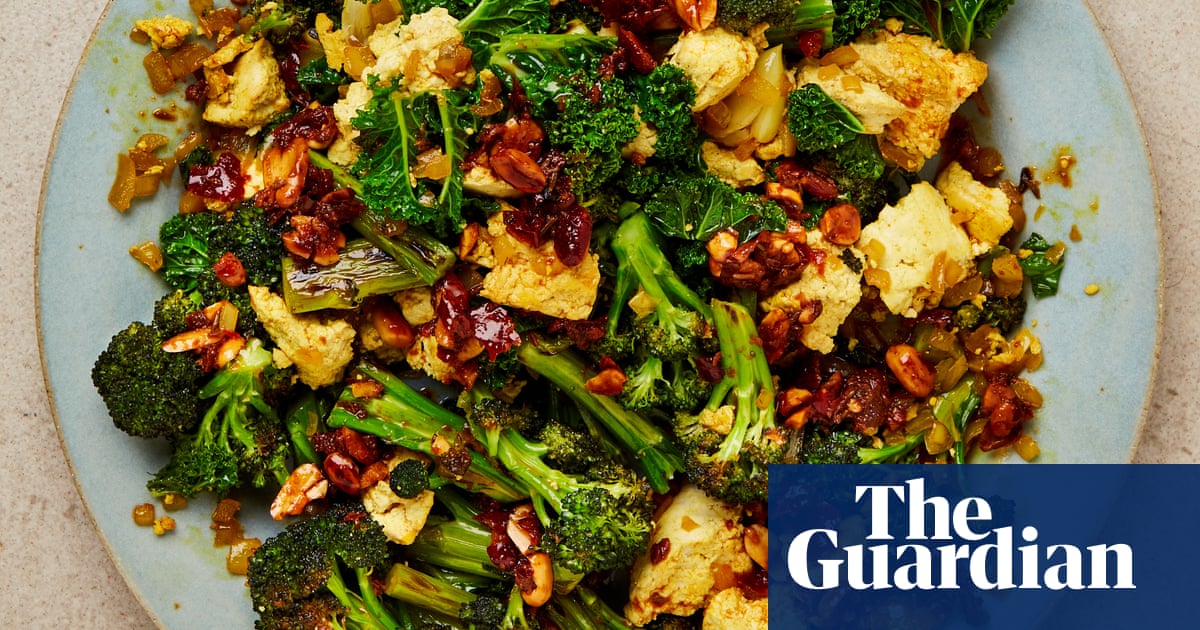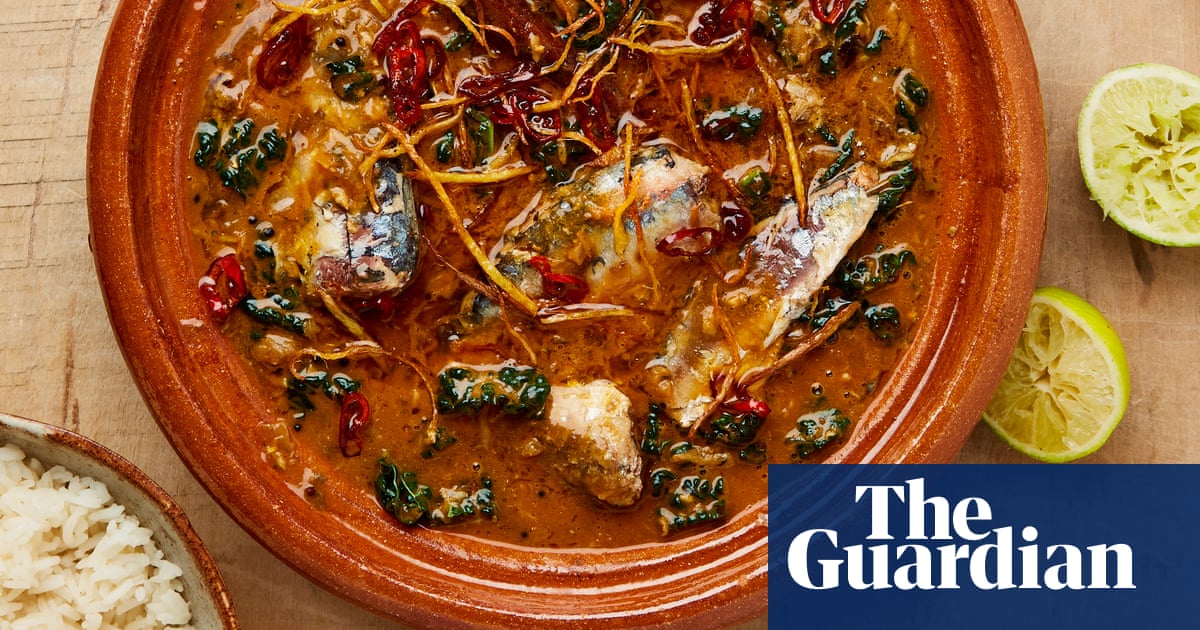
Twenty-nine-, 28-, 18-minute meals: it’s a bold and, in this case, slightly tongue-in-cheek move to set a stopwatch on exactly how long it takes to get dinner on the table. Whatever the precise timing, though, the key to a pretty quick meal, if we can just call it that, is threefold. One: have a few punchy ingredients to hand – sheets of seaweed, hot chilli sauces and quick pickles are all fast ways to get maximum flavour into a meal. Two: choose a main ingredient that cooks really quickly – green veg, pasta and eggs are all your friends here. And three: if you can, always double up on things and roll them into the next meal – quick pickles (again) and spicy peanut oils, for example. Before you know it, some meals are almost going to be making themselves. Meals that actually save you time in the making: now that would be a bold move!
Tofu with purple sprouting broccoli and spicy peanut oil (pictured top)
Doubanjiang is a fermented chilli bean sauce from Sichuan. It’s super-salty, savoury and spicy, as well as brilliant at dialling the flavour all the way up to 10. Make more chilli peanut oil than you need for this: it’s great to have around to spoon over all sorts of roast veg, meat and fish, or even just on a couple of fried eggs. This works well on its own or with rice on the side.
Prep 10 min
Cook 19 min
Serves 2
3 garlic cloves, peeled, 1 finely crushed, and the other 2 bashed with the flat of a large knife
½ tsp cumin seeds
2 tsp doubanjiang
25g skin-on raw peanuts, lightly crushed in a mortar
90ml olive oil
250g purple sprouting broccoli, or Tenderstem, cut into 5cm-long pieces and thick stalks cut in half lengthways
Fine sea salt and black pepper
60g kale, tough stems removed and discarded, the rest roughly chopped
½ onion, peeled and finely chopped (140g)
¼ tsp ground turmeric
280g extra-firm tofu, broken into roughly 3-4 cm pieces
2 tsp soy sauce
½ tsp toasted sesame oil
Put the crushed garlic, cumin and doubanjiang in a small heatproof bowl. Put the peanuts and 60ml of the oil in a small pan on a medium heat for five minutes, stirring occasionally, until lightly browned and fragrant. Pour the oil and nuts into the doubanjiang mixture, stir to combine, then set aside.
Put the remaining two tablespoons of oil in a large frying pan on a high heat and, once it’s hot, add the broccoli and an eighth of a teaspoon of salt, and stir-fry for four minutes, until the broccoli is nicely charred and almost tender. Add the two lightly bashed garlic cloves, stir-fry for 30 seconds, just until lightly charred, then add the kale and three tablespoons of water, and cook, stirring constantly, over a high heat until the kale wilts and softens. Tip into a bowl, return the pan to the stove and turn down the heat to medium-high.
Put two tablespoons of the oil from the peanut chilli oil bowl into the pan, add the chopped onion, turmeric and a quarter-teaspoon of salt, and cook, stirring often, for five minutes, until the onion starts to soften. Turn the heat back up to high, add the tofu, soy sauce and sesame oil, and cook, stirring constantly, for three minutes more, until the tofu has heated through and absorbed the seasoning.
Return the kale and broccoli mixture to the pan and fry, stirring, for another minute, just to heat through. Transfer to a large platter, spoon the peanut chilli oil over the top and serve at once.
Spaghetti with sea bass and nori butter
This has all the freshness and simplicity of spaghetti alle vongole, with added umami richness from the seaweed. Toast any leftover nori sheets, then crush them and mix with sesame seeds and chilli flakes to make your own furikake; they’re also great added to vegetarian gravy. Get everything prepped, chopped and lined up before you turn on the heat here: that way, the dish will be ready in minutes.
Prep 10 min
Cook 18 min
Serves 2
200g spaghetti
Fine sea salt and black pepper
1½ nori sheets (3g)
3 tbsp olive oil
1½ tsp capers, drained
2 garlic cloves, peeled and thinly sliced
1 tsp aleppo chilli flakes, or ½ tsp regular chilli flakes
5g (1⅓ tbsp) parsley leaves, roughly chopped
40g unsalted butter, cut into small pieces
4 sustainably sourced sea bass fillets (240g), skinned and sliced into 5cm pieces
1 tsp lemon juice
Bring a large pot of water to a boil, then drop in the spaghetti and a teaspoon of salt, and cook for 10 minutes (or for a minute less than the packet instructions), until cooked but still al dente. Drain the pasta, reserving 150ml of its cooking water.
While the pasta is cooking, make the sauce. Put a large, ideally high-sided frying pan on a medium-high heat, add the nori sheets and toast for 15 seconds on each side, until shiny and crisp. Take off the heat and, using your hands, crush the sheets into small shards. Set aside about a third of the nori, for serving.
Put two tablespoons of oil in the pan, return it to the heat and add half the capers, half the garlic and half the chilli. Once they’re all sizzling, fry, stirring, for two minutes, until the garlic is just turning golden, then tip into a heat-resistant bowl and set aside.
Put the remaining two-thirds of the crushed nori, the rest of the oil, capers, garlic and chilli flakes, all the parsley, half the butter and a few good twists of black pepper in the hot pan, and fry, stirring frequently, for about a minute, until fragrant but not coloured.
Add the sliced fish, sprinkle over a quarter-teaspoon of salt and fry for two minutes, swirling the pan occasionally, until the fish is almost opaque. Add the spaghetti, reserved pasta water, lemon juice and remaining butter, turn up the heat to high and vigorously toss and stir the mix for two minutes, until the sauce is silky and clinging to the pasta.
Divide the pasta between two bowls, sprinkle over the reserved nori shards, drizzle over the reserved garlic-chilli-caper oil and serve immediately.
The Guardian aims to publish recipes for sustainable fish. Check ratings in your region: UK; Australia; US.
Thai-style deep-fried omelette with cucumber pickle
For anyone who’s new to the deep-fried omelette, it may seem all kinds of wrong. Anyone who’s had one before, however, knows that it’s all kinds of right: crisp on the outside, fluffy on the inside. Eat this as it is, with some hot chilli sauce, or turn it into more of a meal with some sticky rice and pickles on the side; picked crab meat also makes a wonderful accompaniment. If you’re making more than one omelette, it’s OK to keep the first one warm in a low oven for the time it takes to make the second one, but ideally it should be eaten straight away, fresh from the pan.
Prep 10 min
Cook 8 min
Makes 1
For the pickle
150g baby cucumbers, or 1 Lebanese cucumber, thinly sliced
2 tsp rice vinegar
1 tsp fish sauce
¼ tsp caster sugar
⅛ tsp sesame oil
2 spring onions, trimmed and sliced into thin rounds (30g)
For the omelette
3 large eggs
1 tsp rice vinegar
1 tsp fish sauce
1 tbsp water
1 tbsp rice flour
⅛ tsp sesame oil
1 garlic clove, peeled and crushed
50g spring onions, trimmed and thinly sliced
⅛ tsp fine salt
100ml sunflower oil, for frying
To serve
1 tsp toasted white and black sesame seeds, or just white ones
A few coriander sprigs
Sriracha, or your favourite hot chilli sauce
Cooked sticky rice (optional)
Put all the pickle ingredients in a bowl, mix well and set aside for up to 30 minutes.
Put all the omelette ingredients except the sunflower oil in a bowl, and whisk to combine.
Put the oil in a small, 18cm nonstick frying pan on a medium-high heat. Once it’s smoking, test to see if the oil is ready by dropping in just a drip of the omelette mix – it should immediately bubble vigorously. Once the oil is ready, carefully pour in the egg mixture and cook for two to three minutes, until the omelette is golden around the edges. Using two spatulas, carefully flip over the omelette, and cook on the other side for another two minutes, until golden and crisp. Again using the two spatulas, lift the omelette out of the pan and on to a plate lined with kitchen paper to drain; blot the top of the omelette with more kitchen paper, to soak up any excess oil.
Sprinkle over the sesame seeds and coriander, and serve with the pickle, hot sauce and rice, if using.












